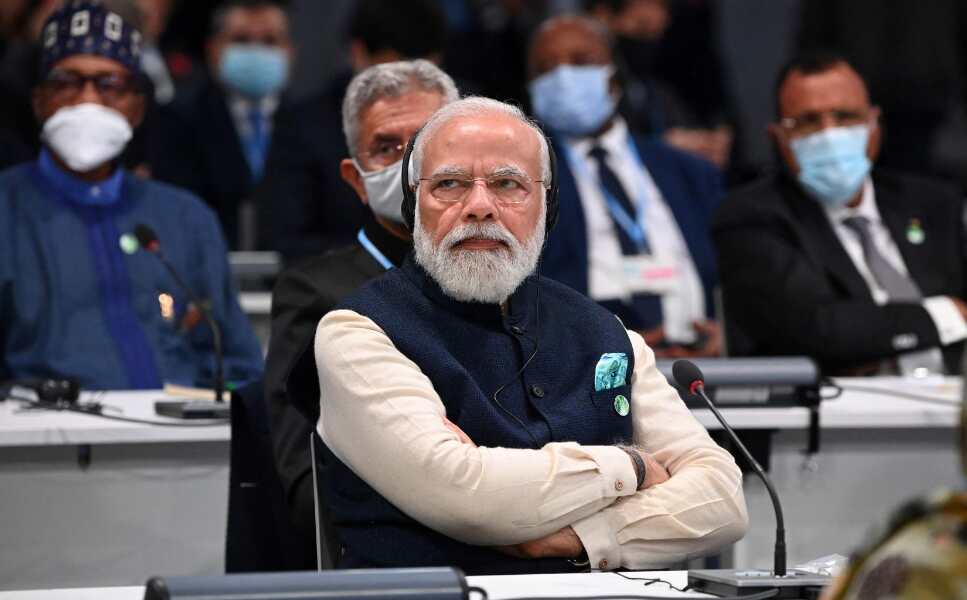Time to act

India appears to be playing its part full well at what is being touted as a potential turning point in the arena of climate change control — the COP 26 Summit. The fact remains to be seen that to what extent India's actions are reciprocated and complemented at the global scale. Meanwhile, India at least shows the world that a path of action in this direction is plausible if there is sufficient willpower. Apart from making a time-bound commitment to achieve net-zero, India has made itself stand out by announcing a reduction in carbon emissions and carbon intensity. The Prime Minister announced an absolute reduction of one billion tonnes of carbon emissions from the projected emissions by 2030. Before the COP26 Summit, India had never committed to making an absolute reduction in carbon emissions. Furthermore, the Prime Minister has pledged that India will reduce its carbon intensity — emissions per unit GDP — by 45 per cent from 2005 levels in 2030. Earlier, India had set a target of reducing carbon intensity by 35 per cent for the same deadline at the Paris Climate Summit. The announcement of a net-zero target by India was one of the most anticipated outcomes of the COP26 Summit. India is now among the 70 plus nations that have committed to net-zero so far. India's pledge in this direction may also have come as a surprise to many as the country had been, till quite recently, speaking against the net-zero trail. It would be interesting to figure out what factors led India to make a sudden U-turn. After all, the concerns raised by India against the inequalities prevailing in climate action between developing and developed countries are real and have consequences. The Environment Minister had very rightly pointed out on Sunday that Common but Differentiated Responsibilities and Respective Capabilities (CBDR-RC) and 'different national circumstances of countries' should be respected while chalking out plans. Another key takeaway from Prime Minister's historic speech at COP26 Summit was regarding India's push towards green energy sources. Notably, during the Paris Climate Summit, India had announced a targeted installed renewable capacity of 450 GW by 2030. India has not only progressed well towards achieving the target but also, at this historic juncture, has pushed the target further to 500 GW. Furthermore, India has also promised a significant change in its energy mix — announcing to achieve an energy mix with 50 per cent coming from non-fossils, up from 40 per cent announced during the Paris Climate Summit. While the world at large is finding it hard to walk the tightrope of climate sustainability, India — accounting for 17 per cent of the global population — appears to be consistent on its path ahead. India is labelled as one of the major carbon emitters of the world, but that should be seen in the light of its developing nature and burgeoning population. One thing is for sure, India's current announcements, particularly the transition towards green energy, will go a long way in shielding the country from the power crises we have seen lately. But how far these announcements go on to tackle the bigger menace of climate change will depend upon how other countries, particularly the developed ones, respond to India's endeavour. Climate is one of the biggest global problems that humans are facing at the present. A solution to it will come through no less than a global action — to which India's commitments form a minuscule but crucial portion. The Prime Minister has, in the clearest terms, said that developed countries are failing to provide a boost to the finances of developing nations so as to enable them to pursue a green path. The PM urged developed countries to provide at least USD 1 trillion in climate finance to assist developing countries. As is well-known, developed countries have been failing time and again in sticking to their commitments to facilitate technology transfer and finances in the light of climate justice. Another key aspect of the PM's speech that merits mentioning is his emphasis on adaptation. Until now, the global climate conferences have, in a lopsided manner, talked only of mitigation and net-zero. There has hardly been any talk on adaptation aspects with regard to climate crises. Poor and developed nations are vulnerable to the most extreme natural disasters that occur on account of climate change — majorly fuelled by the actions of developed nations, historically as well as presently. At COP26, India has the advantage to collaborate with various nations and push forward the concrete demands for justifiable financial devolution and due emphasis on climate adaptation methods. Also, not to be missed is the role of local stakeholders and their methodologies in tackling climate change, which was duly highlighted by the PM. At the top of everything, has been India's call to action. There have been enough failed promises and commitments to date. Now is the time to act. India has shown the world a way, and hopefully, it will be followed by all.



